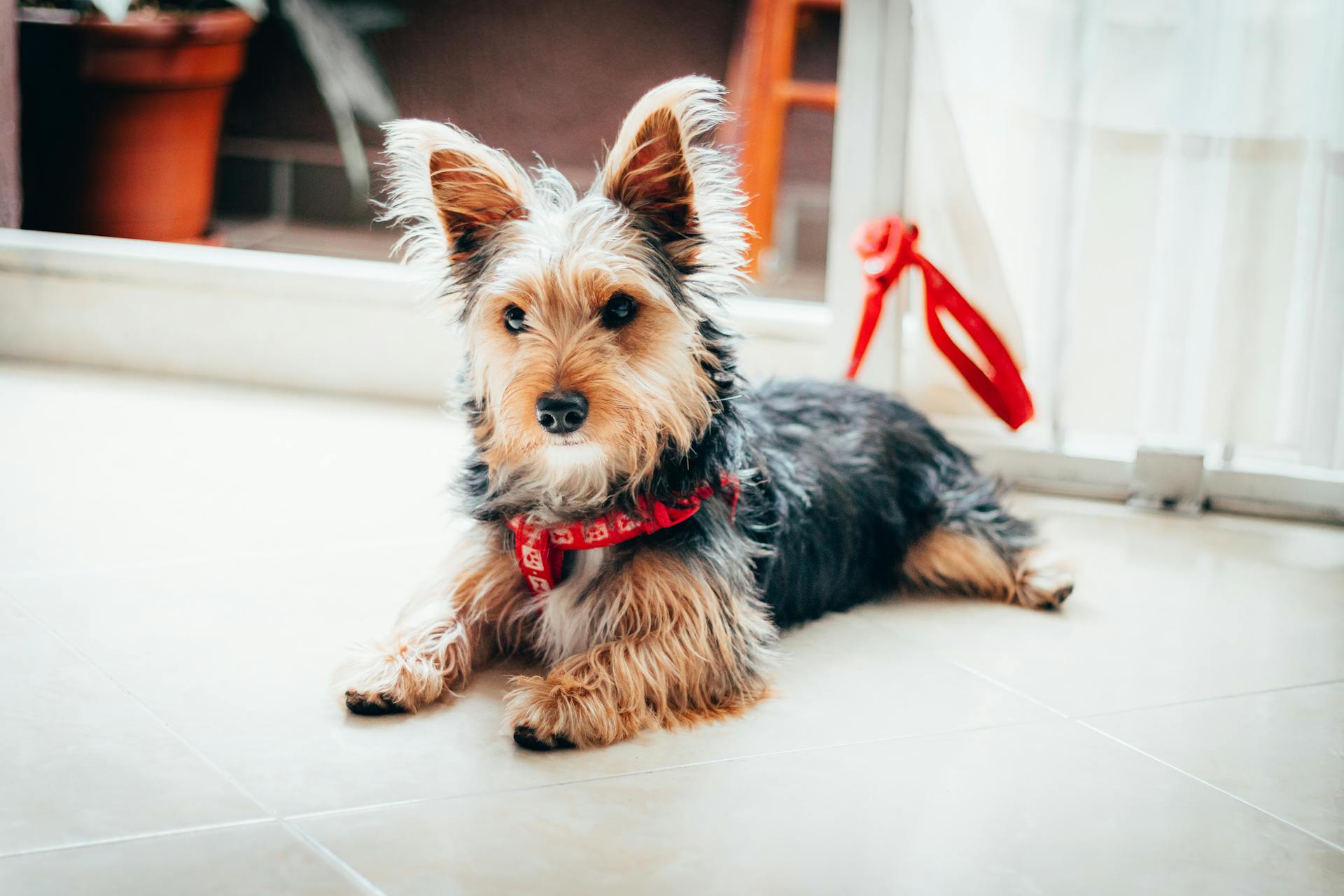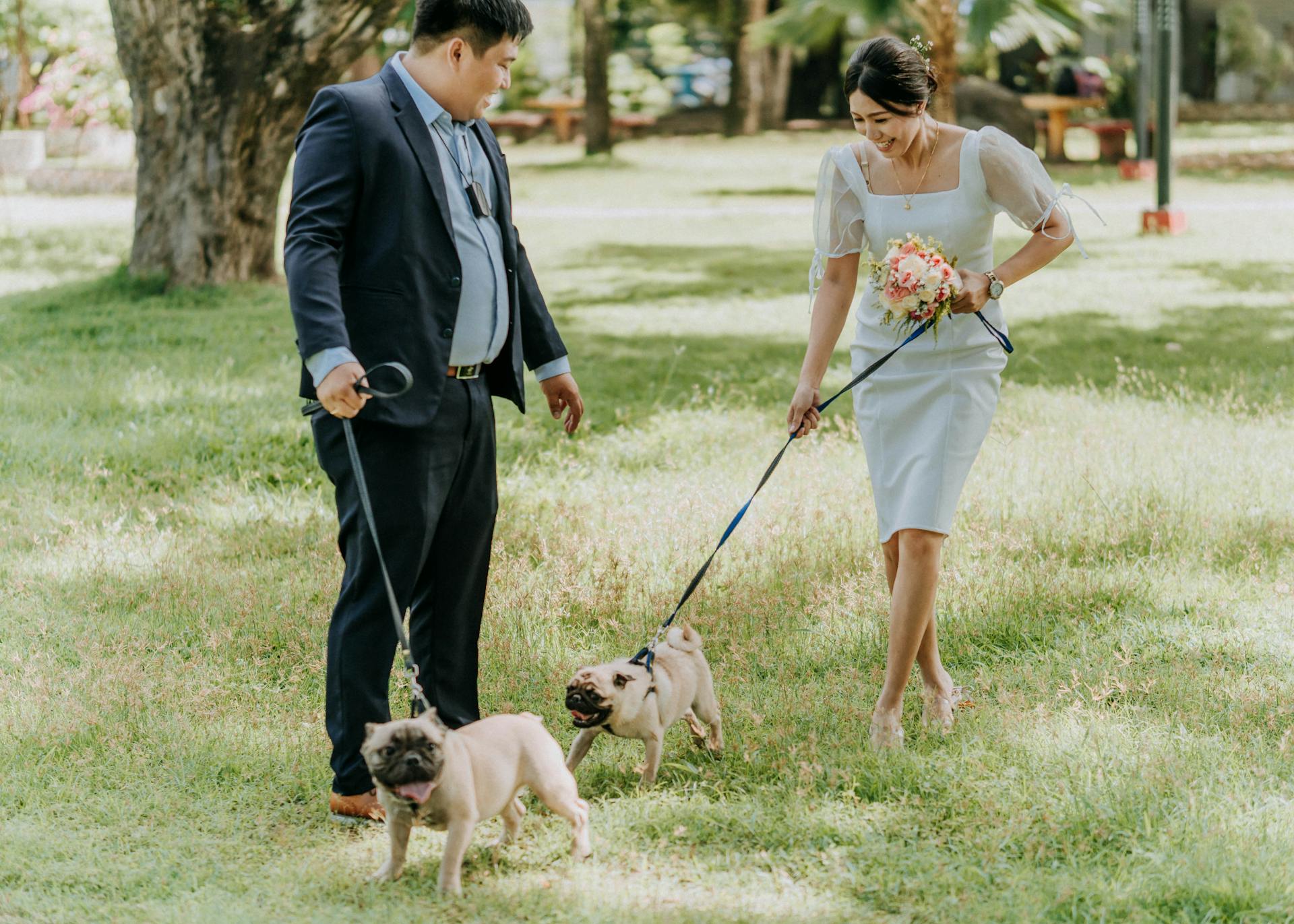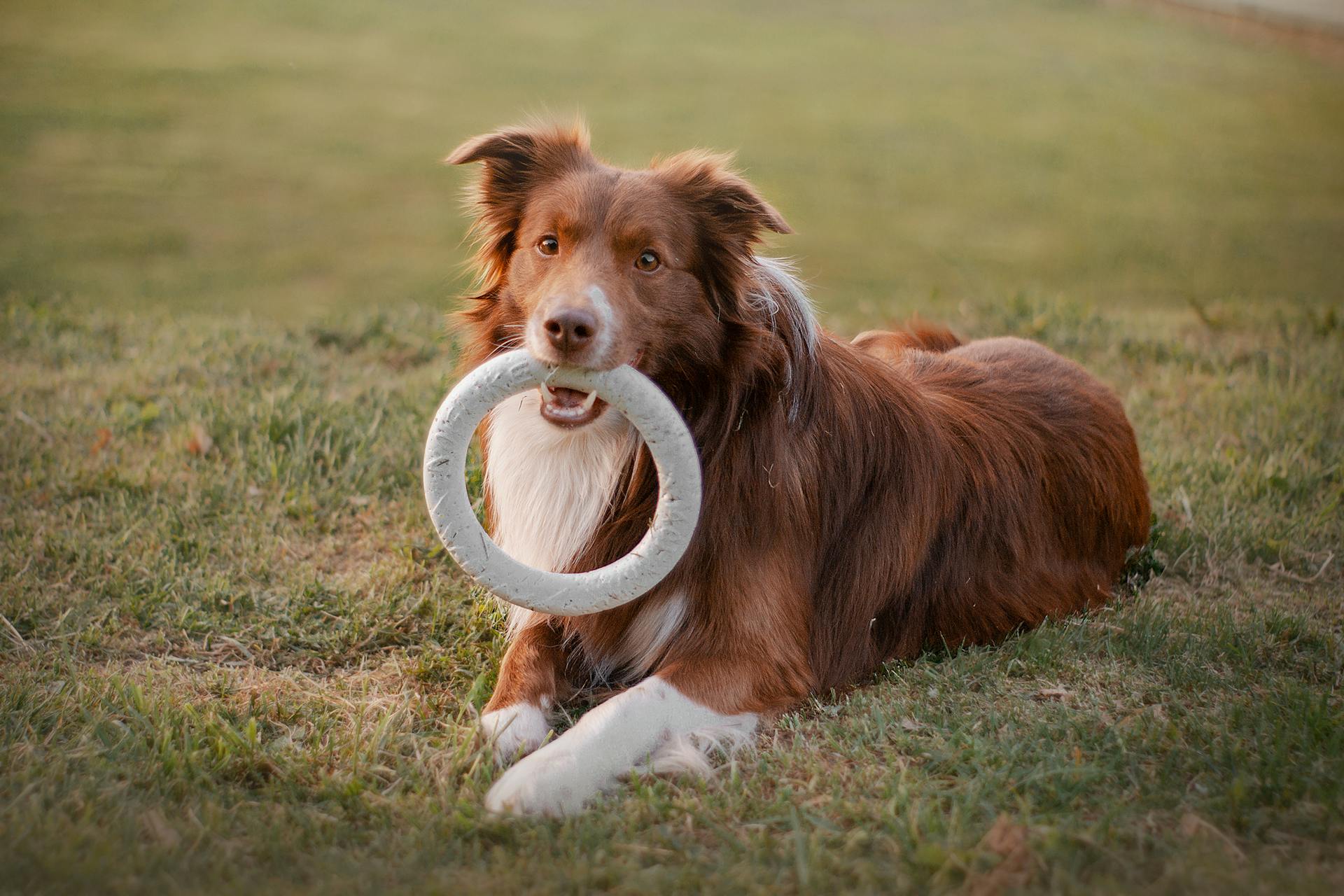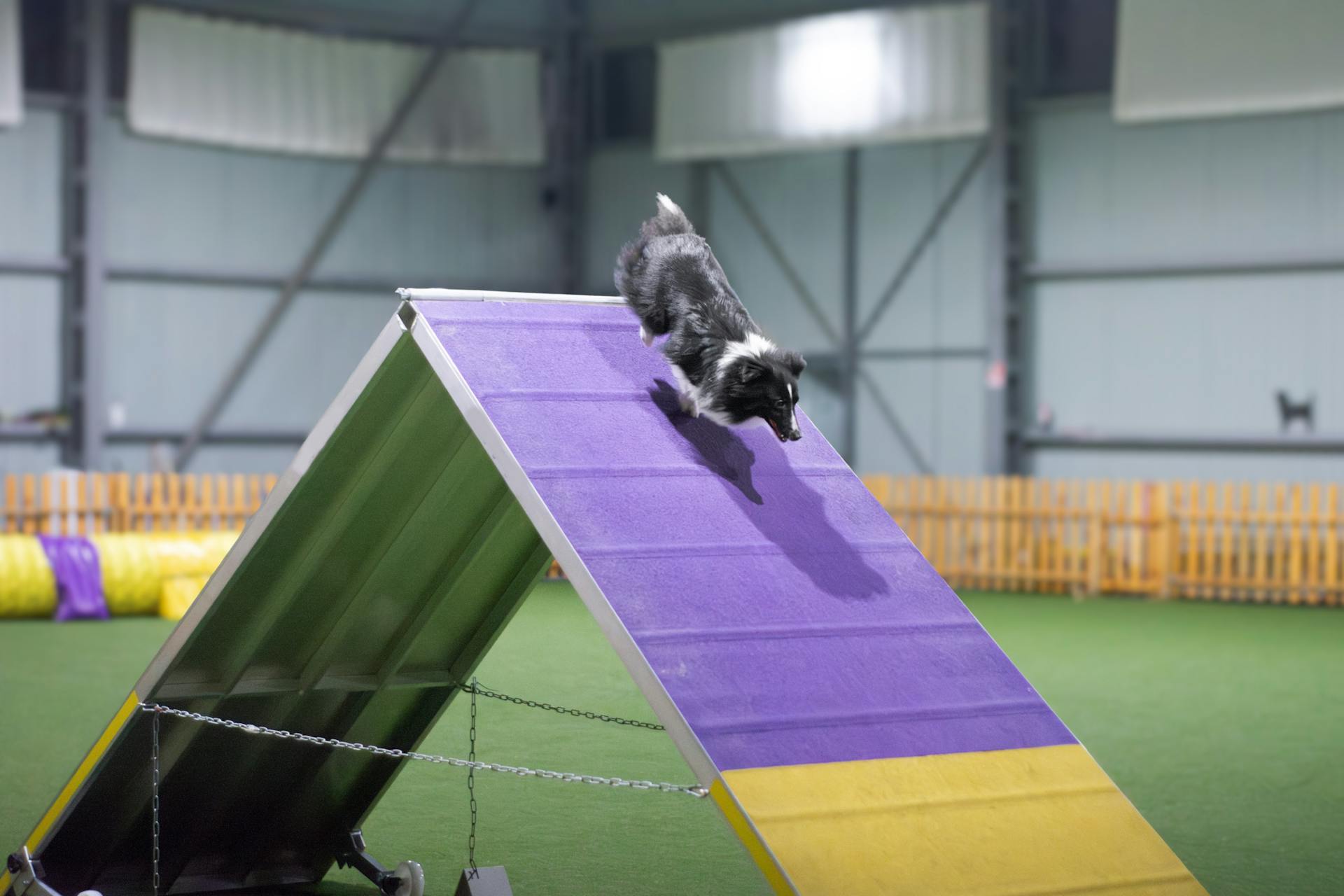
Yorkshire Terriers need regular exercise to stay happy and healthy. They require at least 30 minutes of physical activity per day, but no more than 1 hour.
A daily walk is essential for Yorkies, and they should be taken out at least twice a day. This can be a short walk around the block or a longer walk in a park.
Yorkies are prone to obesity, so it's crucial to monitor their food intake and ensure they're not overeating. A healthy weight is essential for their overall well-being.
As a small breed, Yorkies have a high metabolism, which means they burn energy quickly. This makes them ideal for apartment living, but they still need regular exercise to stay active.
You might enjoy: How Much Exercise Does My Dog Need Calculator?
Yorkshire Terrier Exercise Needs
Yorkshire Terriers need a lot of exercise for a dog of that size, around 45 minutes of proper daily exercise will keep your furry friend stimulated physically and mentally.
This can be achieved through games, walks, or both, and it's essential to provide them with controlled and appropriate exercise to prevent injuries and support their growing bodies. Yorkshire Terrier puppies are full of energy and curiosity, and they need several short play and exercise sessions throughout the day, totaling around 10-15 minutes per session.
Suggestion: Doberman Pinscher Exercise Needs
Puppies should have gentle indoor play, short walks in safe areas, and age-appropriate mental stimulation activities. It's essential to avoid excessive jumping or strenuous activities until they are physically mature, usually around 10-12 months of age.
As your Yorkshire Terrier grows, they will need more exercise, typically requiring around 30 minutes to 1 hour of exercise per day. This can be achieved through short walks, interactive play sessions, and mental stimulation activities.
Here's a rough guide to the exercise needs of Yorkshire Terriers at different stages of their life:
Remember, every dog is unique, so the exercise needs may vary based on their age, health, and energy levels. It's essential to talk with your vet about an exercise routine that's right for your furry friend.
Yorkshire Terrier Health and Care
Yorkshire Terriers require regular exercise to stay healthy and happy, typically around 30 minutes to 1 hour per day, which can be achieved through short walks, interactive play sessions, and mental stimulation activities. Each dog is unique, so exercise needs may vary based on their age, health, and energy levels.
Yorkshire Terrier puppies have a lot of energy and curiosity, but their exercise needs are different from adult dogs. Puppies should have several short play and exercise sessions throughout the day, totaling around 10-15 minutes per session, and avoid excessive jumping or strenuous activities until they are physically mature, usually around 10-12 months of age.
To determine the right amount of exercise for your Yorkshire Terrier, consider their breed-specific needs. Yorkshire Terriers fall into the category of dogs that require 20 to 40 minutes of exercise per day.
You might enjoy: Puppy Yorkie Dogs
Puppy Care and Exercise
Yorkshire Terriers are small dogs with big personalities, and they need regular exercise to stay happy and healthy.
Yorkshire Terriers typically require around 30 minutes to 1 hour of exercise per day, which can be achieved through short walks, interactive play sessions, and mental stimulation activities.
As puppies, Yorkshire Terriers are full of energy and curiosity, but they need controlled and appropriate exercise to prevent injuries and support their growing bodies. Puppies should have several short play and exercise sessions throughout the day, totaling around 10-15 minutes per session.
A fresh viewpoint: Yorkshire Terrier with Short Hair
It's essential to avoid excessive jumping or strenuous activities until they are physically mature, usually around 10-12 months of age. Your vet can advise on the exercise needs of your individual pooch.
Puppies generally have more energy than adult dogs and require more exercise in short bursts, such as the zoomies. Since puppies are constantly growing, several short walks or play sessions throughout the day are a safer choice than going for one really long walk.
Here's a general rule of thumb for exercising your puppy: five minutes per month of age. For example, if your puppy is four months old, you would take them out for 20 minutes a day.
Some breeds, like boxers, bulldogs, and pugs, may have difficulty breathing if they work too hard. If this becomes a problem, consult with your vet to discuss your options.
Remember, every dog is different, and the more time you spend with your pet, the more you'll learn about how much exercise and mental stimulation they need to keep them happy – and you sane!
Intriguing read: Yorkshire Terrier Age Chart
Common Health Problems
Yorkshire terriers are generally a healthy breed, but like all dogs, they can be prone to certain health issues. These issues can be caused by genetics, and it's essential to be aware of them to provide the best care for your Yorkie.
Some common health problems in Yorkies include patellar luxation, which causes the kneecap to move out of place, leading to limping, licking the knee, and bending the knee at an unusual angle.
Collapsing trachea is another issue that can affect Yorkies. It's a chronic and progressive disease that can cause noisy breathing, coughing, exercise intolerance, and retching.
Eye problems are also common in Yorkies, including cataracts, conjunctivitis, progressive retinal atrophy (PRA), and keratoconjunctivitis sicca. Regular eye check-ups can help detect these issues early on.
Portosystemic shunt is a congenital liver disorder that can cause blood to bypass the liver, leading to excessive urination and thirst, diarrhea, vomiting, circling, head pressing, and seizures.
A unique perspective: Yorkshire Terrier Common Health Problems
Heart disease is another concern for Yorkies, and regular veterinary check-ups are crucial to detect early signs.
Intervertebral disc disease can cause a slipped disc in the spine, leading to lameness, dragging limbs, and stepping on the wrong side of the paw.
Dental issues, such as gum disease and plaque and tartar buildup, can also affect Yorkies, causing loss of appetite, difficulty eating, swollen face, and pawing at the mouth.
Here are some common health problems in Yorkies, along with their symptoms:
- Patellar luxation: limping, licking the knee, bending the knee at an unusual angle
- Collapsing trachea: noisy breathing, coughing, exercise intolerance, retching
- Eye problems: cataracts, conjunctivitis, progressive retinal atrophy (PRA), keratoconjunctivitis sicca
- Portosystemic shunt: excessive urination and thirst, diarrhea, vomiting, circling, head pressing, seizures
- Heart disease: early signs can be difficult to detect
- Intervertebral disc disease: lameness, dragging limbs, stepping on the wrong side of the paw
- Dental issues: loss of appetite, difficulty eating, swollen face, pawing at the mouth
Yorkshire Terrier Types and Characteristics
Yorkshire Terriers are known for their big personality, which is surprising given their small size. They have an affectionate yet feisty temperament, making them a joy to be around.
Their love for snuggling is matched only by their love for activity, as they require regular exercise to stay happy and healthy. They're also very playful and vigilant, always on the lookout for something exciting.
In terms of temperament, here are some key characteristics to keep in mind:
Yorkies are also very vocal, barking a lot to alert you to potential threats or interesting sights. With their high energy level and playful nature, it's no wonder they need regular exercise to stay happy and healthy.
Yorkshire Terrier Types
Yorkshire Terriers are a fun-loving breed that require regular exercise to stay happy and healthy.
Tug-of-War is a great game for them, as it's a high-energy activity that also teaches them to retrieve.
Fetch is another excellent option, but you may need to adapt the game to accommodate their small size.
A smaller-sized tennis ball is a must to prevent choking hazards.
Playing Tug-of-War requires durable toys specifically designed for the game, as regular toys can harm their teeth.
Fetch, on the other hand, helps them learn commands like "drop" and "return".
Yorkshire Terrier Characteristics
Yorkshire Terriers are known for their big personality, despite their small size. They're affectionate and feisty, always ready to play or snuggle.
One of the most distinctive characteristics of Yorkies is their love of vocalizing. They bark a lot, and it's not uncommon to hear them alerting you to every little thing.
Here are some key characteristics of Yorkshire Terriers:
Yorkies are naturally vigilant, always on the lookout for potential threats. This makes them excellent watchdogs, even if they are small in size.
Their high energy level means they need regular exercise to stay happy and healthy.
General Dog Care
A Yorkshire Terrier needs 20 to 40 minutes of daily exercise. This can be achieved through regular walks and playtime.
It's essential to consider the dog's age and health when determining the exercise routine. Puppies, for example, need five minutes of exercise per month of age, so a four-month-old puppy would require 20 minutes of exercise per day.
Older dogs, on the other hand, may need more frequent, shorter walks due to arthritis or other health issues. As the owner, you're the best judge of how much exercise your dog can comfortably handle.
Intriguing read: Yorkshire Terrier Age Calculator
Indoor Dog Care
Taking care of your furry friend indoors can be just as effective as outdoor activities. Stairs are a great way to build muscle, especially for high-energy breeds.
Indoor games like hide-and-seek are mentally stimulating and get your dog moving. You can also work in a game of chase.
Some dog breeds may find stairs challenging, especially those with long backs and shorter legs. Be sure to take special care with these breeds.
Additional reading: How to Care for a Yorkie Dog
A treadmill designed for dogs is a great exercise option for high-energy breeds. With careful training, your dog may grow to love treadmill workouts.
Games of tug build muscle and strengthen the human-animal bond. Most dogs enjoy tug, and there are a wide variety of tug toys available.
Agility training can be done at home using household supplies, such as broom handles, boxes, and ottomans. You can even make your own course.
Here are some indoor dog exercises you can do with your pup:
- Stairs
- Hide-and-Seek
- Treadmill
- Tug
- Agility
Tips on Dog Care
As a dog owner, it's essential to understand your furry friend's exercise needs to keep them happy and healthy. Exercising your dog daily is crucial, and the right amount of exercise will keep them mentally stimulated and physically in shape.
The length of your dog's walk depends on their breed. For example, a Bichon Frise, Lhasa Apso, Pug, or Shih Tzu only needs a 20-minute walk, while a Border Collie, Boxer, Dalmatian, or German Shepherd requires a 2-hour walk or more.
On a similar theme: Yorkshire Terrier Names
Puppies need exercise, but it's essential to avoid overexerting them. A general rule is to give them five minutes of exercise per month of age. So, if your puppy is four months old, you should take them out for 20 minutes a day.
Older dogs may need more frequent, shorter walks due to arthritis. If your dog seems in pain while walking or is having trouble maneuvering, consult with your vet about medication to help reduce discomfort.
In addition to walks, there are many other activities you can do with your dog to keep them exercised and stimulated. Scent games, such as hiding treats around the house, can keep your dog engaged and active. You can also try agility lessons, which provide a fun and challenging way to exercise your dog.
Here are some fun indoor exercises you can do with your dog on rainy or hot days:
- Running up and down stairs (be careful not to overexert your dog, especially those with long backs and shorter legs)
- Hide-and-seek
- Using a dog treadmill (for high-energy breeds)
- Playing tug games with a variety of tug toys
- Creating an indoor agility course using household items or equipment made for the sport
Sources
- https://www.pitpat.com/exercise/how-much-exercise-does-a-yorkshire-terrier-need/
- https://www.thepetvet.co.uk/pet-advice/how-much-exercise-does-your-dog-need
- https://www.thesprucepets.com/yorkshire-terrier-dog-preed-profile-1118010
- https://www.borrowmydoggy.com/doggypedia/dog-breed-guides-yorkshire-terrier
- https://www.akc.org/expert-advice/health/how-much-exercise-does-dog-need/
Featured Images: pexels.com


